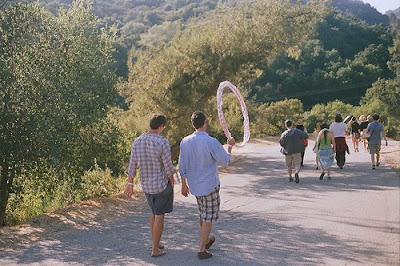
william t. vollmann's epic new book IMPERIAL beats out infinite jest by a solid 200 pages or so. given that it took me an entire summer in college to tackle the latter, i have no idea when i'll find time to read the former. but sam anderson's review in nymag intrigues:
"I was sitting on the train one day chipping away at William T. Vollmann’s latest slab of obsessional nonfiction when my friend Tsia, who incidentally is not an underage Thai street whore, offered to save me time with a blurby one-sentence review based entirely on the book’s cover and my synopsis of its first 50 pages. “Just write that it’s like Robert Caro’s The Power Broker,” she said, “but with the attitude of Mike Davis’s City of Quartz.” This struck me as good advice, and I was all set to take it, but as I worked my way through the book’s final 1,250 pages, I found I had to modify it, slightly, to read as follows: Imperial is like Robert Caro’s The Power Broker with the attitude of Mike Davis’s City of Quartz, if Robert Caro had been raised in an abandoned grain silo by a band of feral raccoons, and if Mike Davis were the communications director of a heavily armed libertarian survivalist cult, and if the two of them had somehow managed to stitch John McPhee’s cortex onto the brain of a Gila monster, which they then sent to the Mexican border to conduct ten years of immersive research, and also if they wrote the entire manuscript on dried banana leaves with a toucan beak dipped in hobo blood, and then the book was line-edited during a 36-hour peyote séance by the ghosts of John Steinbeck, Jack London, and Sinclair Lewis, with 200 pages of endnotes faxed over by Henry David Thoreau’s great-great-great-great grandson from a concrete bunker under a toxic pond behind a maquiladora, and if at the last minute Herman Melville threw up all over the manuscript, rendering it illegible, so it had to be re-created from memory by a community-theater actor doing his best impression of Jack Kerouac. With photographs by Dorothea Lange. (Viking has my full blessing to use that as a blurb.)"
the nytimes offers a more informative, if less flavorful, synopsis: "The book is a little like the Imperial Valley itself: pathless, fascinating, exhausting. Its two great themes are illegal immigration — the struggle of countless thousands of Mexicans to sneak into the United States through the Imperial Valley — and water, which has transformed the valley, or parts of it, from desert to seeming paradise but at great environmental cost."
powerhouse books (a small publishing co. with an awesome storefront/gallery space in their DUMBO office) will release a companion set of vollmann photographs taken during his 12 years of research



(vollman's tome coincides with a new pynchon release (INHERENT VICE) partially set in recent ND haunt, topanga canyon. check out wired magazine's "unofficial thomas pynchon guide to LA")

































